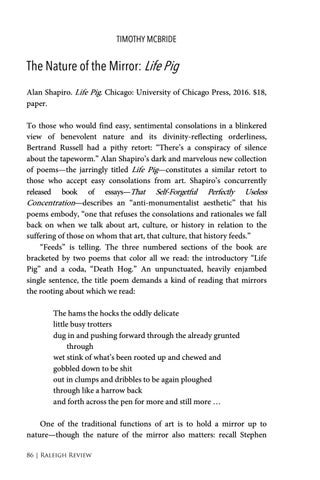TIMOTHY MCBRIDE
The Nature of the Mirror: Life Pig Alan Shapiro. Life Pig. Chicago: University of Chicago Press, 2016. $18, paper. To those who would find easy, sentimental consolations in a blinkered view of benevolent nature and its divinity-reflecting orderliness, Bertrand Russell had a pithy retort: “There’s a conspiracy of silence about the tapeworm.” Alan Shapiro’s dark and marvelous new collection of poems—the jarringly titled Life Pig—constitutes a similar retort to those who accept easy consolations from art. Shapiro’s concurrently released book of essays—That Self-Forgetful Perfectly Useless Concentration—describes an “anti-monumentalist aesthetic” that his poems embody, “one that refuses the consolations and rationales we fall back on when we talk about art, culture, or history in relation to the suffering of those on whom that art, that culture, that history feeds.” “Feeds” is telling. The three numbered sections of the book are bracketed by two poems that color all we read: the introductory “Life Pig” and a coda, “Death Hog.” An unpunctuated, heavily enjambed single sentence, the title poem demands a kind of reading that mirrors the rooting about which we read: The hams the hocks the oddly delicate little busy trotters dug in and pushing forward through the already grunted through wet stink of what’s been rooted up and chewed and gobbled down to be shit out in clumps and dribbles to be again ploughed through like a harrow back and forth across the pen for more and still more … One of the traditional functions of art is to hold a mirror up to nature—though the nature of the mirror also matters: recall Stephen 86 | Raleigh Review




